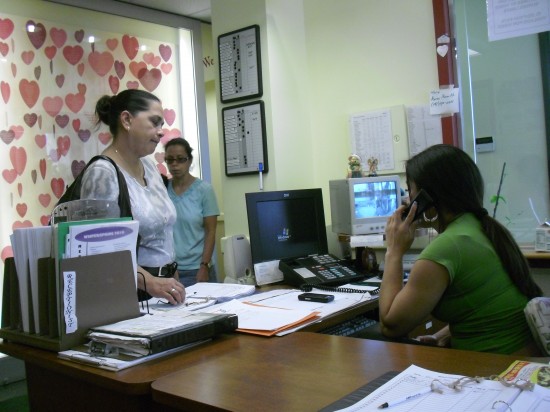
For immigrants and the poor, center offers a welcome and support
Heidy Rios knows what it’s like to be poor. Born and raised in the Bronx, for a time she had so little money that she and her children lived in an apartment that had no stove or refrigerator. She kept food cold by putting it on the windowsill during the winter.
She remembers being fearful and embarrassed when she went to job interviews. She didn’t know how to turn on a computer, let alone use one.
Then, one day when she dropped her children off at St. Pius V School on East 144th Street, Rios found a flyer advertising the services of Mercy Center, which was headquartered at the school at the time.
At Mercy Center, she learned parenting skills, graduated from a computer class and earned her GED. In gratitude, she worked at the center as a volunteer. Her commitment paid off when the center offered her a job.
Fifteen years have passed, and the confidence she gained shows as Rios greets visitors attending classes at Mercy Center, which is now located in its own building on East 145th Street and Willis Avenue. Her five children continue to attend after-school programs and girl talk workshops and perform community service.
Twenty years ago, Sister Mary Ann Dirr, a member of the Sisters of Mercy, arrived in Mott Haven. She found a neighborhood suffering from crack, crime and poverty. City agencies abandoned the South Bronx; the Catholic Church stayed.
Working with two volunteers from the neighborhood, Sister Dirr established a counseling center in a single classroom at St. Pius V.
Now, Mercy Center has grown to employ 20 bilingual staff members and 200 professional volunteers. Last year it served more than 2,000 clients from some 700 families.
Its focus remains women and families. It helps women learn parenting and family life skills, and prepares them to start their own businesses or work in the job market. Other programs include alternatives to violence classes, immigration services, youth services, after-school programs, yoga and spirituality groups and English as a Second Language.
From its beginning, Mercy Center’s programs have been geared toward women. “Women in poor or any community, from rural to urban, hold up the family. They keep it together, and need more help in sustaining family,” explained Blanca Ramirez, the center’s coordinator of direct social services, who has been at Mercy Center for three years.
The center’s English classes have proved to be among its most popular programs.
If people “can’t communicate with people important in their lives, such as teachers or doctors, it’s a problem,” says Ramirez. That’s why Mercy started teaching English as a second language.
America Reyes agrees. She can “socialize with people now,” she said, adding that she “was timid before, but is empowered through English.”
Areida Beltran a 50-year-old immigrant from Central America, has lost her fear of speaking English. Now when she goes to the hospital, she can speak for herself and ask for what she needs.
Margarita Navarro, can now speak English at her children’s school. She said she can read her children’s report cards and understand their needs.
The language classes, Ramirez says, do more than just teach English; they bring people together from all over the world to support one another.
Ramirez, who describes herself as an “old time organizer,” said the “spirit of hospitality is what makes Mercy Center different” from other social service organization that cater to women. Other places make you wait in line or take a number, she says. At Mercy, visitors are directed to a comfortable lounge to wait for help from a staff member.
The person who greets them warmly in either Spanish or English and escorts them to the lounge is Heidy Rios.
A version of this story appeared in the Summer 2010 issue of the Mott Haven Herald.
